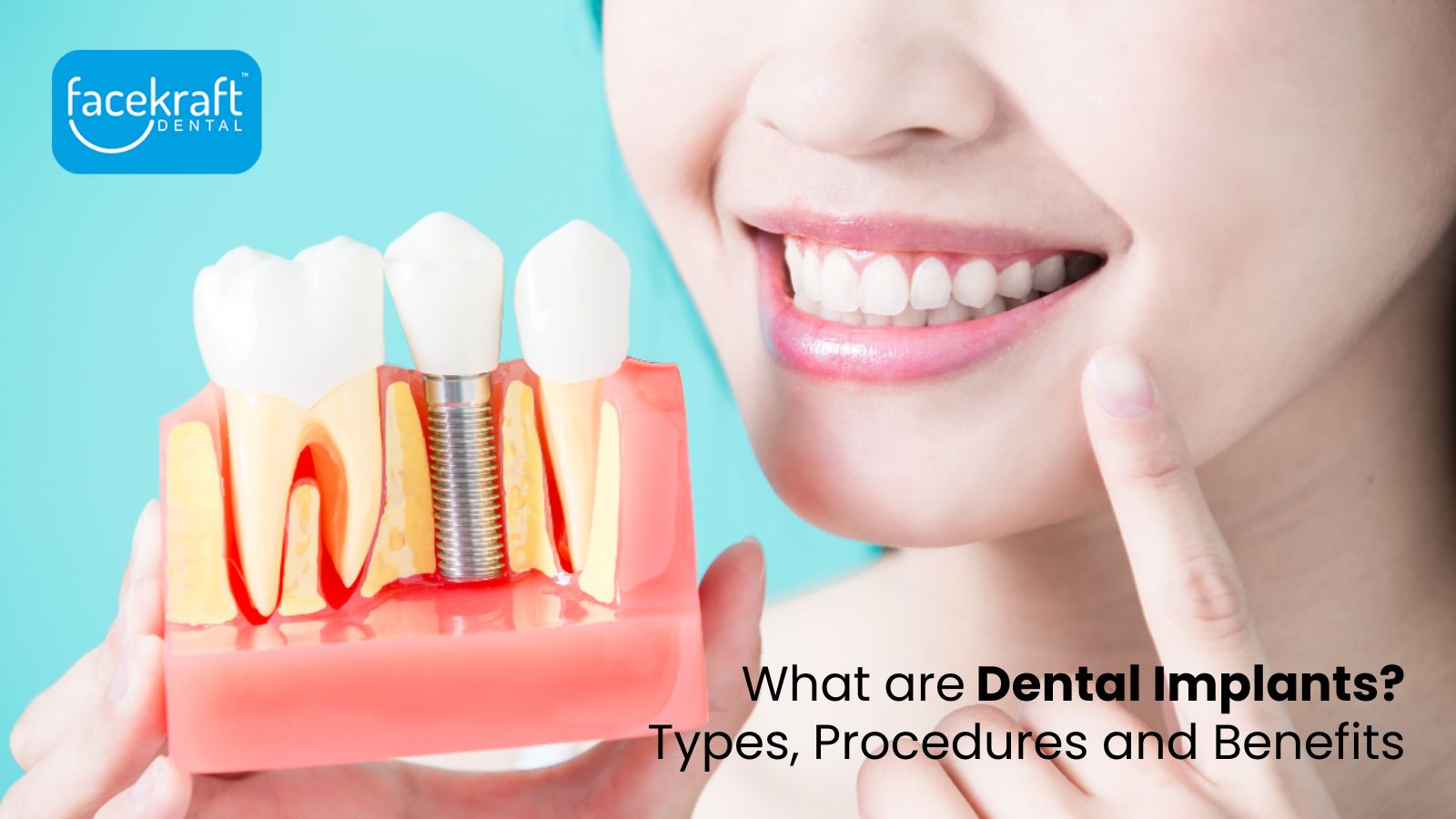Root Canal Treatment: Everything You Need to Know

What are Dental Implants? Types, Procedures and Benefits
Dental implants are artificial tooth roots that are placed into the jawbone to support a replacement tooth or bridge. They offer a durable and long-lasting solution for individuals with missing teeth. Dental implants are considered one of the most effective and advanced options for tooth replacement.
Types of Dental Implants:
Endosteal Implants
These are the most common type of dental implants. They are surgically placed directly into the jawbone. Once the surrounding gum tissue has healed, a second surgery is needed to connect a post to the original implant. Finally, an artificial tooth (or teeth) is attached to the post individually or grouped on a bridge or denture.
Subperiosteal Implants
These implants are placed under the gum but on or above the jawbone. They are often used for patients who have a shallow jawbone and are not able to undergo a bone augmentation procedure. A metal frame is fitted onto the jawbone just below the gum tissue, and as the gums heal, the frame becomes fixed. Posts are then attached to the frame, and artificial teeth are mounted onto these posts.
Procedures for Dental Implants:
Initial Consultation
The first step involves a comprehensive examination, including dental X-rays, to assess the condition of your jawbone and determine whether you’re a suitable candidate for dental implants.
Preparation
If your jawbone is deemed adequate, the next step is the surgical placement of the dental implant. The implant is surgically embedded into the jawbone during this procedure. This step requires a healing period, typically a few months, during which the implant fuses with the bone in a process called osseointegration.
Abutment Placement
Once osseointegration is complete, a minor surgical procedure is performed by your dentist or oral surgeon to place an abutment, which serves as a connector between the implant and the replacement tooth.
Final Restoration
After the gum tissue has healed around the abutment, the best dentist in Jaipur will take impressions of your teeth and jawbone to create the final replacement tooth or teeth. This can be a crown, bridge, or denture, depending on the number of missing teeth and your specific needs.
Maintenance and Follow-up
Regular check-ups and good oral hygiene are essential to the long-term success of dental implants. Brushing, flossing, and visiting your dentist like Facekraft Dental Clinic in Jaipur for routine cleanings are crucial to ensure the health and stability of the implant.
Benefits of Dental Implant Systems
Dental implant systems offer a range of benefits for individuals with missing teeth. Here are some of the key advantages:
Natural Appearance and Functionality
Dental implants closely mimic the look, feel, and function of natural teeth. They are designed to blend seamlessly with your existing teeth, providing a natural appearance and restoring your ability to chew, speak, and smile confidently.
Longevity and Durability
Dental implants are known for their exceptional durability and longevity. With proper care and maintenance, they can last for many years, often even a lifetime. This makes them a cost-effective long-term solution compared to other tooth replacement options.
Preservation of Jawbone
When you lose a tooth, the surrounding jawbone can start to deteriorate over time. Dental implants help stimulate and preserve the jawbone, preventing bone loss and maintaining the structural integrity of your facial features.
Improved Oral Health
Dental implants do not require alterations to adjacent teeth, as is often the case with dental bridges. This preserves the natural tooth structure and promotes better overall oral health.
Enhanced Chewing and Speech
Unlike removable dentures, dental implants provide a stable and secure foundation for chewing and speaking. This allows you to enjoy a wide variety of foods and speak without concerns of slippage or discomfort.
Comfort and Convenience
Dental implants eliminate the discomfort and inconvenience associated with removable dentures. There is no need for adhesives or removal for cleaning, which can greatly improve your quality of life.
Improved Self-Confidence
Dental implants can have a positive impact on your self-esteem and confidence. You can smile, eat, and socialize without worrying about gaps or the appearance of your teeth.
No Impact on Adjacent Teeth
Dental implants are standalone replacements, meaning they don’t rely on neighboring teeth for support. This helps maintain the health and integrity of your remaining natural teeth.
Customization
Dental implants can be tailored to your individual needs and preferences. They can be used to replace a single tooth, multiple teeth, or even an entire arch of teeth.
Stable and Secure
Implants are firmly anchored in the jawbone, providing stability and security comparable to natural teeth. This eliminates the worry of dentures shifting or falling out.
Easy Maintenance
Caring for dental implants is similar to caring for natural teeth. Regular brushing, flossing, and dental check-ups are all that’s needed to maintain their health and appearance.
Conclusion
It’s important to note that while dental implants offer numerous benefits, not everyone may be a suitable candidate for the procedure. Factors such as overall health, jawbone density, and gum health play a role in determining eligibility. Consulting with a qualified and experienced dentist in Jaipur or oral surgeon is crucial to determine if dental implants are the right solution for your specific situation.
Dental implant procedures can vary based on individual patient needs and the specific techniques used by the best dental clinic or oral surgeon in Jaipur. It’s important to consult with a qualified dental specialist near me to determine the best treatment plan for your unique situation.
